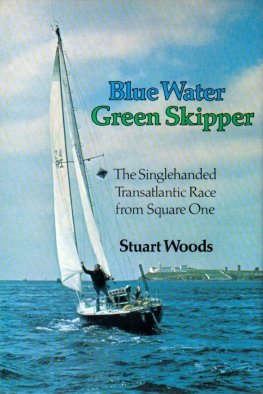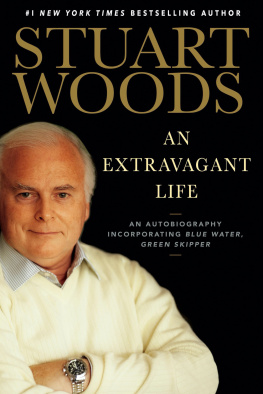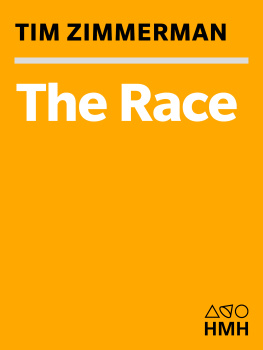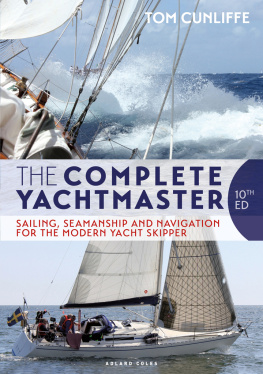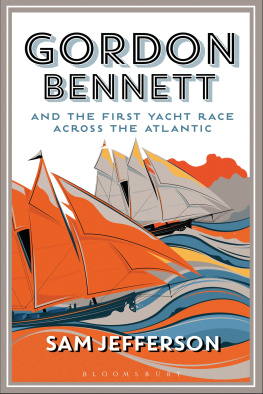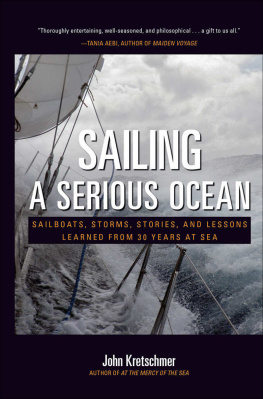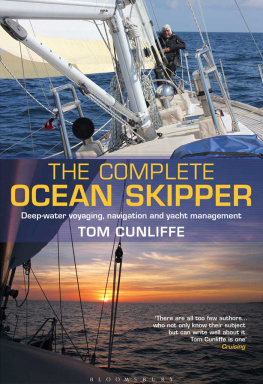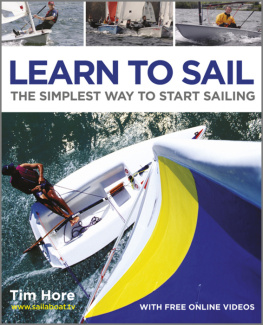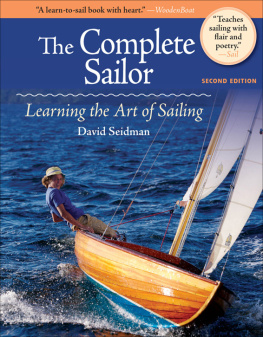Stuart Woods
Blue Water, Green Skipper: A Memoir of Sailing Alone Across the Atlantic
This book is for
Mike and Lizzie McMullen
I believe I have mentioned nearly everyone who helped my project in the text of this book, but inevitably I may have left someone out in the rush to publication. If I have done so, I hope the persons left out will believe that they are not forgotten. It was a solo event, but literally dozens of people played absolutely essential parts in the preparations.
I am particularly indebted to Angela Green of the Promotions Department of The Observer for her assistance in helping me learn what happened to other competitors, and for the loan of her logbook and records.
I owe special thanks to my editor, Peter Coles of Stanford Maritime, for his continuing interest in my project and his hard work on this book, and to his colleagues Rosemary Lister and Mike Davies for their help.
George and Elizabeth Golemis, of the Newport Loft, were very kind to me and made sure that Golden Harp was cared for and sailed after I left Newport, seeing that she survived a hurricane undamaged.
Finally, I feel I must thank Ron Holland again for his genius, his expertise, his hard work, and his friendship. I commend him to you as the designer of your next yacht.
I stood in this place for the second time in forty minutes, a small, neat bay, surrounded by low hills, white cottages, a ruined mansion, and an unspecified number of dairy cattle, chewing their way through the morning. This choppy stretch of water was covered by a churning gray sky and contained half a dozen small plastic buoys and an old stone pier. Perhaps stood constitutes sloppy use of the language, for about forty knots of wind had me leaning at an unnatural angle to the perpendicular and the hairs on the leeward side of my body standing at an equally unnatural angle to my skin. I had not yet learned that a mild, sunny beginning to an Irish morning does not obviate the necessity for a sheepskin coat and gumboots at a slightly later hour, and I could not, for the life of me, see the Galway Bay Sailing Club.
I drove back to the Thatched Pub in Oranmore and explained my problem to its keeper. As he had already done twice on that morning, he began patiently to direct me to Rinville Bay. I interrupted to explain that I was certain I had found the bay but could not find the clubhouse.
Ah, said George the innkeeper, with the raised eyebrows of the enlightened, theres not a clubhouse, ysee; theres just the club, like.
I gaped at him uncomprehendingly, unable to shake my preconception of the neat building, the flagpole, and the ruddy-faced chaps gathered in the net-draped bar. George leapt into the silence, which every Irishman abhors: Theres just the club, and Id say theyre not likely to be out just yet. It was March, I had to give him that, but it was a Sunday too, and the paperback I had read had led me to believe that your enthusiastic yachtsman, if not actually on the water nowabouts, would at least be varnishing or splicing something in preparation for the event, and if not that, knocking a few back and talking about it at the very least.
George fixed his gaze on the Guinness pump handle before him, trying hard to be helpful. Pierce Purcell, he said, looking relieved. Youd want to speak to Pierce Purcell, hes the secretary or one of the people, like, and youd find him in the book.
The Irish Department of Posts and Telegraphs, because of the small size of the country, the low density of the population, and its own extreme reluctance to provide any of them with a telephone, has managed to gather all the nations telephone listings into just one directory, which is, in size, roughly equal to the combined bulk of the Old Testament, the New Testament, the I Ching, and The Joy of Sex. It proved to contain at least a page of closely spaced Purcells, far too many of them P.s, P.J.s and even Pierces, and none of them in Galway. George tried again.
Ferdia ORiordan, he said, this time with real conviction. The book offered us even more ORiordans than Purcells, but no Ferdias in Galway. The Bank of Ireland, said George with finality. Thats where he works, at the branch in Salthill. But in Ireland only the pubs are open on a Sunday, so I thanked George and postponed my search for sailing yet another day.
Sailing had been wafting around the hindmost part of my head since the summer of 1966, when friends had invited me to their summer home in Castine, Maine, and, back in my native USA, taken me sailing every day the wind blew. I had been enchanted with the notion that one could move across the face of the waters, fueled by nothing more than the wind, and I had resolved that if ever I were domiciled in any reasonable proximity to the sea I would learn to sail upon it. I thought, even, that since so much of the world was covered with water and since it lapped against so many interesting places, that I should like to sail right the way round, stopping everywhere.
Eventually, I finished a ten-year hitch in New York advertising, did another three in London, and then, propelled by a lifelong desire to write A Novel, hied myself to the west of Ireland, to County Galway, to Lough Cutra Castle, near Gort, where I resided not in the castle but in the adjacent stableyard, in a flat. I spent two days a week in Dublin, writing television commercials and ads for an advertising agency, and the rest of the time in County Galway, writing my novel or, at least, thinking about it.
Lough Cutra was an ideal place four hundred acres of grounds, twelve hundred acres of lake, and enough peace and quiet to make it very difficult to find an excuse not to write. To live this sort of existence you have to be either very lucky or very single. Looking back, I still find it difficult to believe I was able to get away with this for two years.
Soon after my arrival in Ireland, in early 1973, I perceived that it was surrounded by water, and the sailing notion, so long displaced by an absorbing career and an athletic social life in New York and London, began to winnow its way into my frontal lobe. I bought a book which suggested that the way to go about learning to sail was to start with a small dinghy, then work up to larger things as desire and funds dictated. For several winter weeks I scoured the west, looking for a small boat to buy or someone who knew where to buy one or someone who knew someone who knew. Just when I was beginning to think that I was the only person in the counties Galway, Clare, and Mayo who realized that Ireland was an island, a friend in Galway, who believed that water should be fished in and not sailed upon, admitted that he had heard of the existence of a sailing club in or near Galway City.
He was pretty cagey about it all, but still, I had managed to penetrate the alleged clubs apparent security arrangements to the point where I now had an actual name and an actual telephone number to call. Journeying to the public telephone in Mrs. Piggots Grocery Store in Gort, I gave the operator the number, inserted the required coinage into the instrument, and waited the customary seven minutes to be connected. To my surprise, there really was a Ferdia ORiordan at the Bank of Ireland in Salthill, and he very generously invited me to join him for a sail the following Sunday, behaving as if the Galway Bay Sailing Club were common knowledge and had nothing whatever to hide.
During the week which followed I reread my book on sailing and bought another, wishing to be as au fait as possible without actually having set foot in any sort of boat for seven years. The Sunday arrived and I again found myself at Rinville. Nothing had changed, except that the wind was blowing slightly less hard and the temperature had crept up a degree or two. The place was still deserted, and I sat in my battered Mini, chatting idly with Fred, a 4-pound, five-week-old example of the golden Labrador breed, who graciously permitted me to share my flat with him. At last, a car materialized next to mine, towing a boat covered with canvas. From this car emerged Ferdia ORiordan, his very pretty wife, and two irresistible little girls, with whom Fred evidenced an immediate empathy. Leaving the two children and the puppy rolling in the grass, we removed the canvas from the boat, revealing a gleaming example of the GP Fourteen class, erected the mast, bent on the sails, and trundled the lot at breakneck speed down the rocky shore. Ferdia and I stripped off our shoes and socks, rolled up our trouser legs, and waded into the icy water. In a trice, I was experiencing again that giddy sensation of motion over water which had so mesmerized me in Maine seven summers before.

